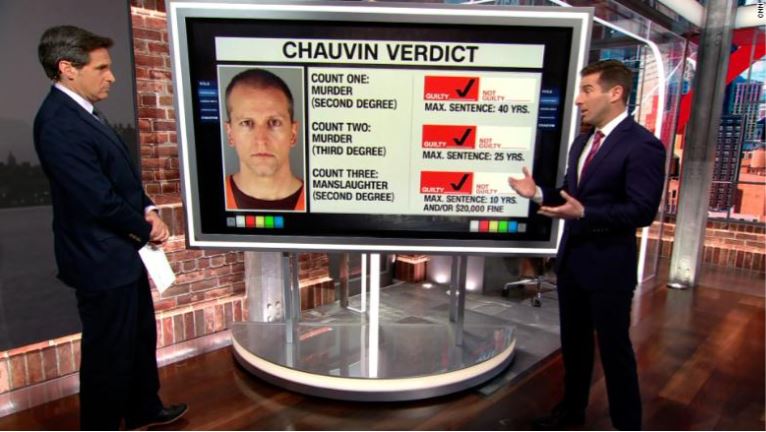Chauvin Sentencing and Lesser-Includeds
No, he can't get up to 75 years.

I am seeing a lot of reports along the lines suggested in the idiotic graphic from CNN that sits atop this post. But it’s important that, while Derek Chauvin was convicted of Second-Degree and Third-Degree Murder and Second-Degree Manslaughter in the death of George Floyd, they’re stacked versions of the same crime. He’ll be sentenced for each of them as though they were separate offenses, mostly in case an appeal overturns, say, the Murder Two conviction. But he’ll serve them concurrently.
One has to read deep into the CNN story to get that understanding:
Chauvin will be sentenced in about eight weeks — so, around the second week of June — Judge Peter Cahill said Tuesday, with a precise date to be announced.
Although Chauvin had been out on bail since October, Cahill revoked Chauvin’s bail after the verdict. Chauvin will now await sentencing while behind bars.
[…]
Chauvin’s sentence will depend on several factors, including the state’s sentencing guidelines, and whether the judge decides to go beyond the guidelines because of certain circumstances.Technically, Chauvin could face up to 40 years in prison for second-degree murder, up to 25 years for third-degree murder, and up to 10 years for manslaughter.
However, Chauvin has no prior criminal record. The state’s guidelines say that for such a person, the presumptive sentence for both second-degree and third-degree murder is 12 1/2 years. The judge is given discretion to hand down a sentence between 10 years and eight months and 15 years for each.
Second-degree manslaughter carries a presumptive sentence of four years for someone with no record, according to the guidelines. The judge’s discretion ranges from three years and five months to four years and eight months.
However, prosecutors are asking for a tougher sentence than the recommendations provide.
In two filings last year, prosecutors said five aggravating factors warrant an increased sentence. Those factors include that Floyd was particularly vulnerable, that he was treated with particular cruelty, and that children were present when the crimes were committed. If the judge applies aggravating factors, it would shift Chauvin’s sentence to a higher part of the legal range. The sentences for all three crimes would likely be served at the same time, not consecutively. “Generally, when an offender is convicted of multiple current offenses… concurrent sentencing is presumptive,” according to the guidelines.
Even that understates the matter. Chauvin committed a single crime. Prosecutors charged him with every version of the crime consistent with the facts but they’re lesser-included offenses, not current offenses.






Thank you for this. I have been amazed at all of the Google School of Law graduates in the media and elsewhere who seem incapable of grasping these concepts (or they’re just more interested in the juicy soundbite headline).
And I’ll say that Waters and her prejudicial theatrics aside, there is still a decently solid basis for appeal here (that they will pursue an appeal is a certainty). We’ll have to see how that process plays out. He’ll certainly serve time for something.
This is our sensationalistic press displaying their worst instincts. Speaking in maximal terms and ignoring the specifics to hype the situation. And it’s very dangerous. What’s the expected reaction when after planting the idea that 40 years is possible, then the sentence comes back at even the high side of the recommended range?
“Chauvin should have gotten 40 years, but he’ll only be in for 15! It’s a travesty of justice!”
Appalling.
@HarvardLaw92:
One ground for speak that I’ve seen since last night is that the Judge apparently instructed me jury to use a “reasonable person” standards.
In Graham v Conner 490 U.S. 386 (1989) the Supreme Court seems to suggest that that the standard should be a reasonable police officee standard
I’m not sure that this would be enough to toss the verdictm
The rule of media is the higher paid the personality, the less likely they are to bother themselves with minor annoyances like “facts” and “context”. I’ll bet the court beat reporters who wrote this up for the local MSP press explained this. (Just checked the Star-Tribune, and, yup, here’s the explainer sidebar.) We’re living in a world where a good part of the media lies (Fox et. al.) and another part of it is just, frankly, stupid at worst or bury the lede for sensation (as CNN did in this piece). It’s no mystery why most people don’t understand or are just wrong about a lot of the facts surrounding the issues of the day.
I’ll just leave it at whatever sentence he receives is not long enough and that I am a mean-spirited and vengeful person.
@Doug Mataconis:
I’d go further than to say that Graham v. Connor suggests. It mandates the reasonable officer perspective, but that has to be weighed against the (admittedly non-exhaustive) list of considered factors. After viewing the video, I don’t think that an assertion of reasonableness would be sustained on appeal. They’ll certainly pursue that avenue, I’d think, but I’d be surprised if it goes anywhere. Floyd didn’t seem to be actively resisting and I wouldn’t reasonably say that he represented a threat to officer safety, so it’ll be an uphill climb.
I think they may get more traction from the assertion of a poisoned jury pool, but it’s to some degree uncharted waters. The remedy there would be a retrial, obviously, so how they’d go about carrying out that order is up in the air.
@HarvardLaw92:
Agreed
I think that prison sentences are generally too long. Incarceration should deter recidivism, and prison is a terrible enough experience that a couple of years will suffice for people capable of learning from experience. I’ll grant that there are incorrigibles. A sentence of more than three years runs a real risk of destroying the soul.
BTW, both sides presented testimony from police about the appropriateness of the force used. The Minneapolis Chief of Police testified.
@HarvardLaw92:
Google. You wish.
These are social media law school graduates. They regurgitate wherever they read or see a meme of. Google might actually lead you to accurate, relevant legal texts. At least, if you search for them.
@HarvardLaw92:
I see this a lot, and it baffles me every time I do. Graham v Connor was a 1983 action that set the standard for what it takes for police action to be unconstitutional. Where is it written that a state can’t impose a higher standard in their criminal law than the constitutional minimum?
@Roger:
Considering it from the perspective of the average citizen is considered to be a broader standard. States can impose more restrictive standards, but they can’t broaden them beyond what the court has dictated.